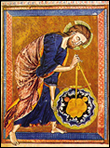Nature as a Book in Robert Boyle's Works
A selection of quotes from the Works of Robert Boyle
«Both our Divines and our Philosophers, compose Man’s Library of three cheife Books, which to Expound, apply and Rectify, is the Taske of the rest. Few men ignore that these 3 Volumes, are The Booke of Nature, the Book call’d Scripture, and the Booke of Conscience. Of the 2 latter of which having elsewhere express‟t my Thoughts, I shall now addict them to engage all capable and Intelligent Persons to the neglected study of the First».
Of the Study of the Book of Nature, in The Works of Robert Boyle, 14 vols., edited by M. Hunter and E.B. Davis (London: Pickering & Chatto, 1999-2000), vol. 13, p. 147.
«For the Book of Nature is to an ordinary Gazer, and a Naturalist, like a rare Book of Hieroglyphicks to a Child, and a Philosopher: the one is sufficiently pleas'd with the Odnesse and Variety of the Curious Pictures that adorne it; whereas the other is not only delighted with those outward objects that gratifie his sense, but receives a much higher satisfaction in admiring the knowledg of the Author, and in finding out and inriching himselfe with those abstruse and vailed Truths dexterously hinted in them».
Some Consideration touching the Usefulness of Experimental Natural Philosophy, Oxford 1663, p. 4.
«God has made some knowledge of his created book, both conducive to belief, and necessary to the understanding of the written one»
Some Consideration touching the Usefulness of Experimental Natural Philosophy, ibidem, p. 30.
«But as the two great books, of Nature and of Scripture, have the same Author; so the study of the latter does not at all hinder any Inquisitive man’s delight in the study of the former»
The Excellency of Theology compared with Natural Theology, London 1674, p. 121.
«The book of nature, is a fine and large piece of tapestry rolled up, which we are not able to see all at once, but must be content to wait for the discovery of its beauty, and symmetry, little by little, as it gradually comes to be more and more unfolded, or displayed»
The Christian Virtuoso (Posthumous publications 1692-1744), in The Works of Robert Boyle, edited by M. Hunter and E.B. Davis, 14 vols. (New York: Routledge, 2016), p. 530.
«And having said thus much, which probably is more than enough, to show that a man, that admires the wisdom of God conspicuous in his works, may discern both it and divers other adorable attributes, more gloriously displayed in the book we call scripture, than in the book of nature. I shall now resume my interrupted discourse».
The Christian Virtuoso, in ibidem, p. 449.
«It will, probably, be thought somewhat strange, that among the religious virtues, which the contemplation of God’s creatures, is proper to excite, or cherish in our virtuoso, I should reckon humility, since the higher degree of knowledge, that his inspection into God’s works, is reasonably supposed to have given him, seems more likely to puff him up, than to make him humble. But, to counterbalance this temptation, there are divers things in the book of nature, that are very fit to give a well-disposed mind, sentiments of humility, some of which reflections, I shall now briefly mention … ».
The Christian Virtuoso, in ibidem, p. 490.
«To discourse of the love of God, merely as a naturalist, is to treat of it with great disadvantage and imperfection. For of the motives fit to produce that love in us, those are far more powerful, that may be drawn from the reading of that divine book we call the scripture, than those, that are afforded us by the most accurate inspection of the book of nature. For this latter does, indeed, show us a part of what God has done for us; but the former manifests to us, not only, another part, consisting of many other, and greater things, that God, and his only Son have done for us; but (what the contemplation of the creatures, would never have suggested so much as a suspicion of) those afflictions, ignominies, and torments, (worse than the death, they ended in) that his divine Son, by whom he made the world, whereto he granted, has suffered for us».
The Christian Virtuoso, in ibidem, p. 496.
«If a man light upon an anonymous, but excellent poem, that is partly written in plain characters, and partly in cyphers of differing kinds, (as of numbers and transposed letters of the alphabet) it will be much more rational for him to infer, from the verses he does clearly understand, that it was written by an excellent poet, than it were to argue, that because he cannot understand some passages, that are written in cyphers, the author did not show himself a poet, but rather wrote nonsense in those passages; especially, if the peruser, having, by an attentive study, decyphered some part of the critical words, perceives them to be very congruous and apposite. For thence he may very probably gather, that even those passages are so too, that by reason of the transpositions, purposely made of the letters, do not afford good rhymes, but perchance sounds very harsh and unlike to them».
The Christian Virtuoso, in ibidem, p. 501
«At present, what I mainly drive at, may, methinks, be somewhat illustrated, by comparing the object of theology, to a book of excellent notions and secrets, but written in cyphers; and the knowledge of divine things conferred by bare philosophy, to a very imperfect key; consisting of not half the letters of the alphabet; for though, by the help of this, a man may make a shift to understand, here and there, many whole words, that consist of such letters, as his key answers to, and may perchance on the same account, understand some few short and scattered sentences, and other periods; yet the whole scope, and contrivance of the book, and many of the principal things, contained in it, he must be ignorant of: but revelation is like the remaining part of the key, which compleats the other; and which, when he si once possessed of, he will not only learn, many new truths, and understand satisfactorily, many passages, which he but doubtingly, guessed at before; but, which is the main thing in our comparison, he will clearly perceive, that what he has last discovered, both perfectly agrees with what he had learned before, and compleats what it wanted, to make up a symmetrical piece, worthy of the author».
The Christian Virtuoso, in ibidem, p. 520.





